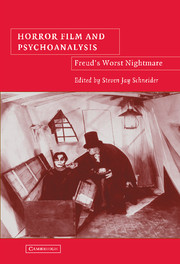Book contents
- Frontmatter
- Contents
- Acknowledgments
- Foreword: “What Lies Beneath?”
- Introduction: “Psychoanalysis in/and/of the Horror Film”
- PART ONE THE QUESTION OF HORROR-PLEASURE
- PART TWO THEORIZING THE UNCANNY
- PART THREE REPRESENTING PSYCHOANALYSIS
- PART FOUR NEW DIRECTIONS
- 12 Doing Things with Theory: From Freud's Worst Nightmare to (Disciplinary) Dreams of Horror's Cultural Value
- 13 The Darker Side of Genius: The (Horror) Auteur Meets Freud's Theory
- 14 Violence and Psychophysiology in Horror Cinema
- Afterword: Psychoanalysis and the Horror Film
- About the Contributors
- Bibliography
- Index
13 - The Darker Side of Genius: The (Horror) Auteur Meets Freud's Theory
Published online by Cambridge University Press: 14 July 2009
- Frontmatter
- Contents
- Acknowledgments
- Foreword: “What Lies Beneath?”
- Introduction: “Psychoanalysis in/and/of the Horror Film”
- PART ONE THE QUESTION OF HORROR-PLEASURE
- PART TWO THEORIZING THE UNCANNY
- PART THREE REPRESENTING PSYCHOANALYSIS
- PART FOUR NEW DIRECTIONS
- 12 Doing Things with Theory: From Freud's Worst Nightmare to (Disciplinary) Dreams of Horror's Cultural Value
- 13 The Darker Side of Genius: The (Horror) Auteur Meets Freud's Theory
- 14 Violence and Psychophysiology in Horror Cinema
- Afterword: Psychoanalysis and the Horror Film
- About the Contributors
- Bibliography
- Index
Summary
Once discredited, the auteur theory has come around again. After haunting “the stately castles of film theory and criticism” (Levy 2001: xi) for more than a quarter century, it has been recovered in a number of unlikely contexts – from structuralism to feminism, queer theory, identity politics, and star theory – and is today a major marketing strategy (Saper 2001: 35). With it comes a core of assumptions based in psychoanalysis. But where discussion of film spectatorship has been dominated by Freud and Lacan, discourses surrounding film authorship have shown little interest in psychoanalysis. I will examine the phenomenon of the horror auteur as an exception to this rule. As recognized in recent meta-films – films about the filmmaking process itself – and in popular and academic culture, the horror auteur exposes the theory's psychoanalytic and gothic assumptions, thus interrogating auteurism while lending it levels of mystique.
Reviewer Jan Stuart has stated my first premise, more or less, in a comment about E. Elias Merhige's Shadow of the Vampire (2000) having the same non-news “The Blair Witch Project had up its threadbare sleeve” – that “there is no greater horror than the making of a horror movie: the terror wrought by an insecure actor, a monomaniacal director, a stalking camera.” However, Stuart disparages a cliché I propose to take seriously as an idea and extend to the making of movies in general: that there is something uncanny about whatever drives the “true” auteur.
- Type
- Chapter
- Information
- Horror Film and PsychoanalysisFreud's Worst Nightmare, pp. 222 - 240Publisher: Cambridge University PressPrint publication year: 2004
- 2
- Cited by

